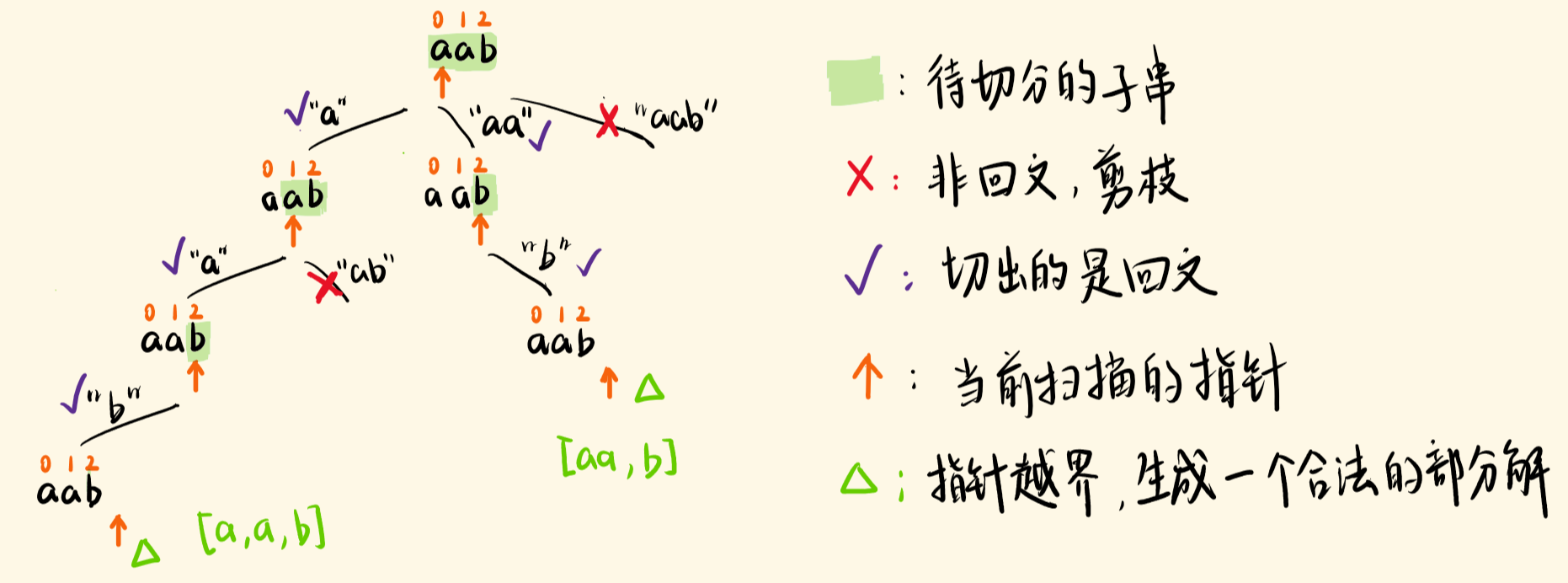回溯算法:分割回文串
131. 分割回文串
给你一个字符串 s,请你将 s 分割成一些子串,使每个子串都是回文串 。返回 s 所有可能的分割方案。
回文串是正着读和反着读都一样的字符串。
输入:s = "aab"
输出:[["a","a","b"],["aa","b"]]
输入:s = "a"
输出:[["a"]]
思路
本题涉及到两个关键问题:
- 切割问题,有不同的切割方式
- 判断回文

回溯三部曲
1.递归函数参数
List<String> temp = new ArrayList<String>(); // 放已经回文的子串
List<List<String>> ans = new ArrayList<List<String>>();
void backtracking (String s, int startIndex) {}
2.递归函数终止条件
在处理组合问题的时候,递归参数需要传入startIndex,表示下一轮递归遍历的起始位置,这个startIndex就是切割线。
切割线切到了字符串最后面,说明找到了一种切割方法,此时就是本层递归的终止终止条件。
3.单层搜索的逻辑
在for (int i = startIndex; i < s.length(); i++)循环中,我们定义了起始位置startIndex,那么 [startIndex, i] 就是要截取的子串。
首先判断这个子串是不是回文,如果是回文,就加入在temp中,用来记录切割过的回文子串。
判断回文子串
使用双指针法,一个指针从前向后,一个指针从后先前,如果前后指针所指向的元素是相等的,就是回文字符串了。
代码
class Solution {
List<String> temp = new ArrayList<String>();
List<List<String>> ans = new ArrayList<List<String>>();
public List<List<String>> partition(String s) {
backtracking(s,0);
return ans;
}
void backtracking (String s, int startIndex) {
// 如果起始位置已经大于s的大小,说明已经找到了一组分割方案了
if (startIndex >= s.length()) {
ans.add(new ArrayList<>(temp));
return;
}
for (int i = startIndex; i < s.length(); i++) {
if (isPalindrome(s, startIndex, i)) { // 是回文子串
// 获取[startIndex,i]在s中的子串
String str = s.substring(startIndex, i + 1);
temp.add(str);
} else { // 不是回文,跳过
continue;
}
backtracking(s, i + 1); // 寻找i+1为起始位置的子串
temp.remove(temp.size()-1); // 回溯过程,弹出本次已经填在的子串
}
}
private boolean isPalindrome(String s, int start, int end) {
for (int i = start, j = end; i < j; i++, j--) {
if (s.charAt(i) != s.charAt(j)) {
return false;
}
}
return true;
}
}



